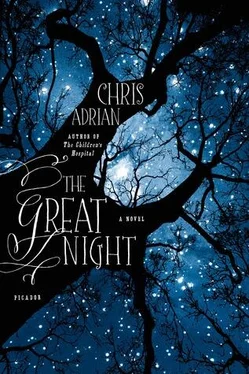“I know,” he said. “But still.” Eventually he relented a little and let her start to exchange things out of other parts of the house, or the basement, and she funneled the tackiest elements into two rooms on the second floor, concentrating the tastelessness there. Bigger than her whole apartment, the basement was mysterious and a little scary. She had a running game of trying to count all the bicycles when she was down there, and she never seemed to get the same number twice. There were walls filled with bottled preserves, with some pickled creatures set here and there among them, as if to trick the unwary into spreading fetal pig on their English muffin, and jars stuffed with leaves and herbs and roots. Molly had sniffed randomly at them. There was pot and hash mixed in randomly with sage and rosemary, and herbs she’d never encountered before, with smells she recognized but couldn’t associate with any plant: old couch, cheesy feet, blood, warm television. He only shrugged when she asked him anything about the old owners, about why the house sat abandoned for so long, or why they needed dozens of bicycles, or why they bottled hamsters in their basement, or kept a cage and a spanking post and a pair of stocks. “It’s San Francisco,” was all he would ever say in speculation. “People do all sorts of things here.”
He darted ahead of her on his skates and went around her in circles as she made her plodding way across the seemingly endless expanse of Crissy Field. There was a strong headwind coming through the Golden Gate; Ryan acted like he didn’t feel it at all. It was something she wouldn’t ordinarily have liked to do, skate-plodding into another county, but doing it with him made it a delightful use of her time. There were all sorts of these things she would ordinarily have found incredibly boring if not actually unpleasant, but which became fun in his company, and sometimes, looking back on what things were like before she met him, it seemed that her whole life had been an unpleasant use of her time and he had changed that. She had tried to tell him as much, but the closest she had come was saying to him, as they sat among the remains of a picnic lunch underneath the golden oak, was, “I’m having a really good time just sitting here with you.” He was lying on his back with one arm around her; she was curled against his side; he was staring up at the leaves. He didn’t answer in words but gave her a squeeze, which she took to mean what she wanted it to, that he was as happy as she was, though he seemed in that moment, and sometimes in others, to be more distracted than happy or sad.
Sausalito, it turned out, was rather a long way away, even with wheels on your shoes. She got tired, though Ryan pulled her along, or pushed her from behind, and they stopped half a mile or so from the bridge, trespassing in somebody’s horse pasture. “Doing nothing with you is my favorite thing in the world,” she said to him, and they lay about silently in the warm, scented grass, in a variety of positions, his head on her chest, her head on his arm, her heavy skated feet on his belly. After half an hour or so of rolling and sprawling, he suggested that they move along, and she said, “In a minute.” Her head was very near his crotch — she only needed to turn her head to roll her face into his dick, which was not particularly obscured by his short shorts. It had been a long time since she had wondered, as she fucked somebody, what her father or her mother would think about it, but there was something about doing it in the open, and underneath the gigantic blue bowl of sky, which her father had once described to her as Jesus’ big blue eyeball, that brought them to mind. It didn’t bother her at all to think, as she suddenly did, that Jesus was going to run tattling to her father, or even to think, as she did next, of her parents gathered round to watch with solemn, disapproving faces. She even gave an extra little thrust here for her father, and dedicated a tickle of Ryan’s balls to her mother, and said to herself and to them, This is what it’s like to be really happy.
“What’s the worst thing that ever happened to you?” she asked him at dinner. He was picking at a bowl of gray seafood stew. It was a limited choice of restaurants that would let them in on roller skates, and this place at least had a lovely view of the city, which was lit up behind him, so if she squinted it looked as if he was wearing the architecture of the higher hills like a hat.
“What sort of question is that?” he asked, looking up and frowning.
“I don’t know,” she said. “I was just thinking I don’t know that about you.” Actually, it was Salome who had thought it up. She had her own ongoing one-sided relationship with Ryan, conducted through the occasional conversation when he came to the shop and, much more significantly, through serial interrogations of Molly as she worked, exercises that always made Molly feel a little defensive, since they seemed intended as much to criticize her fund of knowledge about her beloved as to actually learn about him. “You don’t know where he was born?” Salome had asked, managing to sound innocent and arch at the same time, and she was similarly surprised by Molly’s ignorance of his sister’s age, his grandparents’ countries of origin, and the particulars of his job. “But darling,” she’d said, “you’ve been dating for six months and you don’t know him at all ,” to which Molly had replied that she knew what was important about him, he was a genuinely good person, and she’d known as much after only a few hours. Salome had made a face like Molly had a host of beetles crawling in her hair, and shaken her head solemnly, and said, “No, no, no, no, no.” She’d retreated to the back room without another word, and returned an hour later with her desk-sized calendar, marked through the next month with questions of increasing significance for Molly to ask Ryan, in a four-week program. “How can you know if you love him,” Salome asked, “if you don’t really know him?” Molly didn’t see what one thing had to do with the other, but it wasn’t something she was going to argue about with lonely, neurotic old Salome, who was all theory and no practice. She took the calendar pages and used them to line her cat box. Still, the questions rattled around in her head, and she asked one every now and then, telling herself it didn’t actually matter if Ryan answered them or not.
“Oh,” he said. “I think it’s probably this fish stew.”
“It’s a dumb question,” she said. She quietly put her own answer— my family —back inside herself.
“Not dumb,” he said, “just hard to answer.”
“Too hard to pick one?”
“No. I just … don’t remember. I have a hard time holding on to some stuff. It’s probably for the best, right? Something you can’t remember or describe shouldn’t have any bearing on your life now. If it’s already forgotten, it should be let go. Right?”
“Yes,” Molly said, rather hesitantly. “Are you saying something happened to you that was so bad you can’t remember it, or that the bad things were too trivial to remember?”
“No,” he said, laughing. “I’m saying I’d rather pay attention to the good things. What’s the best thing that ever happened to you?”
“Oh, that’s easy,” she said. “You, hands down.” Now she was smiling too.
“See?” he said. “You too. Hands up, hands down, hands sideways, hands everywhere.” He reached under the table and groped at her belly and her groin.
“Stop,” she said, not actually wanting him to stop.
She fell asleep on the ferry back to San Francisco, nestled against him to hide from the wind on the outside deck. He kept waking her to look at passing marvels: the hulking dark blob of Angel Island and the lights of Alcatraz and a disturbance in the water that he swore was a whale and finally the approaching city. “Look at that,” he said, again and again. “I love that.”
Читать дальше












